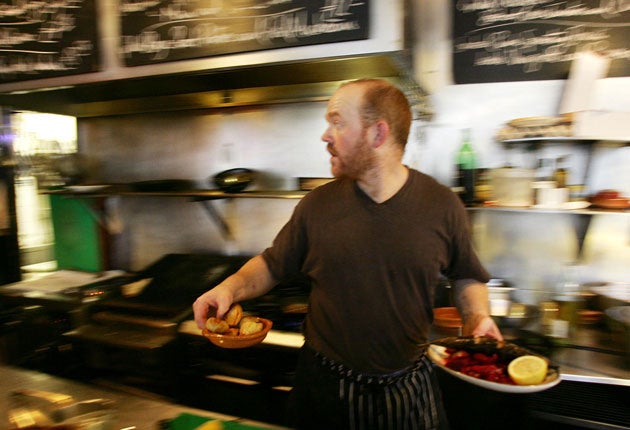Time called on gastropubs
Last orders for metro foodies as hard times see a move back to the bar stool

The gastropub is off. The formerly much-loved eateries and watering holes of choice of metropolitan foodies look to have had their day.
This week the death knell will be sounded when The Good Food Guide, which has chronicled the nation's best restaurants for 60 years and is about to publish its 2012 edition, will deem the word unpalatable in these tough economic times. It has banned it from this and future editions of the guide.
Widely credited with launching the gastropub revolution in 1991, the Eagle in Clerkenwell, London, began offering customers quality food from an open kitchen alongside the bar, starting a trend that many followed.
But Elizabeth Carter, consultant editor for the guide, believes that the term had become a byword for an establishment's ambitions and, at a time when pubs have been hit hard by the recession, this inflexible attitude was becoming a thing of the past. "Our feeling with the gastropub was that it was a bit of a bandwagon that a lot of people have jumped on to. A lot of chains have taken that gastropub style.
"I think customers are getting bored with it. Pubs have to be socially diverse, they have to offer many things whether you pop in for a drink and a snack or you want a proper meal."
This view is supported by a Leisure Wallet report released last week by financial advisers Zolfo Cooper, which showed that the average number of pub visits per person a month had dropped from five to four in the past year and that the average spend per visit was down by 19 per cent to £15.08.
Antony Worrall Thompson, head chef and owner of the Greyhound pub near Henley-on-Thames, approves of the move away from the term. "I hate that word. I think all pubs should avoid the word gastropub. To me it's a bit like all the critics giving a film a triple AAA rating, you go and you think, 'What did they see in that?' It sets you up for disappointment. If you label yourself 'gastropub' you're asking for trouble, that's for sure."
Tom Aikens, the Michelin-starred chef and owner of Tom Aikens Restaurant in Chelsea, disagrees, however, believing that demand will always be there for gastropubs. "I think the gastropub does target a wider audience than a traditional pub or other restaurants and they are pretty flexible in what they serve."
However, the more recent trend the guide wants to represent is highlighted by Simon Goodman, the head chef and co-owner of the Duke of Cumberland Arms in Henley, West Sussex, which is named as Pub of the Year in the latest guide.
He wants to reduce the impact of a booking culture by treating drinkers with respect. When he took over the premises he maintained the atmosphere by keeping the bar element and adding a new dining space.
"To keep the drinkers happy is as much of a mission for me as keeping the restaurant full.
"When I was younger, I wanted a more restaurant-style pub, I was aiming for the very gastro end of the market and fighting for rosettes and prizes; but now I just try to feed people what they want."
The guide's Ms Carter believes the future will see pubs returning to older ways: "Pubs realise that your local business is very important, as is hospitality. It's getting away from being like a restaurant and going back to being a pub."
Additional reporting by Lilee Cathcart and Eshe Nelson
How the bubble began to squeak
1991 The term gastropub is coined when David Eyre and Mike Belben take over the Eagle pub in Clerkenwell, London. Eyre later says: "I am always and continually bemused as to why the Eagle was regarded as a radical idea. We took an obvious idea and gave it a twist."
1996 One of the first exponents of the gastropub, the Starr Inn, in Harome, North Yorkshire, opens. The pub goes on to earn a Michelin star in 2002.
2001 The Stagg Inn in Titley, Herefordshire, is the first pub to earn a Michelin star
2003 The number of gastropubs reaches 5,000 out of a total of 60,000 pubs. The proportion of pubs serving food is now 90 per cent.
2004 The Spotted Pig, widely considered the first gastropub in USA opens in Manhattan West Village, New York
2004 Marks & Spencer oversees the launch of its Gastropub ready-meal range.
2009 BoHo Restaurant opens, the first gastropub in Hollywood.
2010 The wheels appear to be falling off the gastropub bandwagon as Gordon Ramsay has to close the Devonshire in Chiswick after it "fails to meet expectations". The Warrington, in Maida Vale, is sold in August 2011.
2011 The Good Food Guide announces it will no longer use the term "gastropub" in its publications.
Join our commenting forum
Join thought-provoking conversations, follow other Independent readers and see their replies
Comments
Bookmark popover
Removed from bookmarks